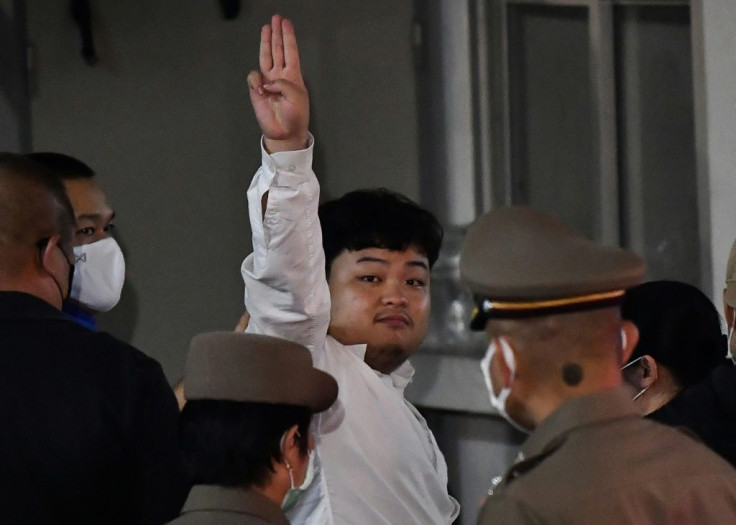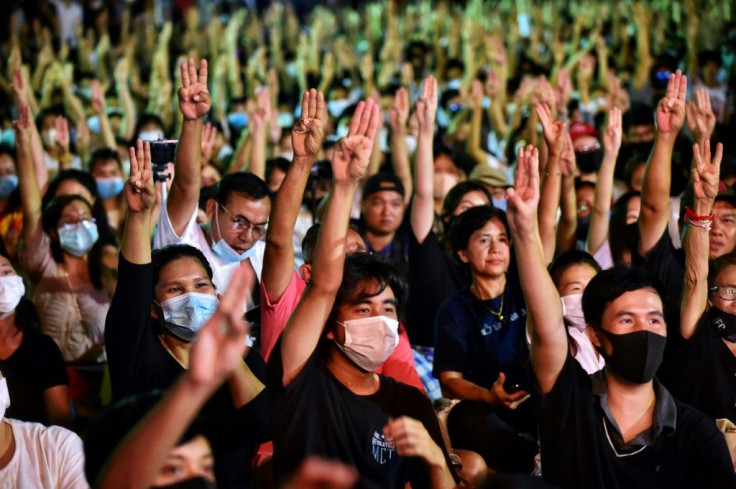Prominent Thai Democracy Activist Arrested
Thai police on Friday arrested a prominent democracy activist following his participation in protests calling for government reforms, a new constitution and an overhaul of a law shielding the powerful monarchy.
Thailand has seen near-daily demonstrations in recent weeks by student-led groups angry at the government of former military chief Prime Minister Prayut Chan-O-Cha.
The arrest of Parit Chiwarak, broadcast live on Facebook by a friend, saw police read out several charges against him before he was bundled into a waiting car, shouting: "Long live democracy!".
"I can confirm that Parit Chiwarak has been arrested... The charges relate to the demonstration on July 18," Police Major General Somprasong Yentaum told AFP, referring to one of the largest rallies so far.
The detention of Chiwarak -- also known as "Penguin" -- is the third in a week after two other protesters were arrested last Friday on the same charges, which include sedition and breaking coronavirus regulations. They were subsequently released on bail.
The protesters, partly inspired by the Hong Kong democracy movement, have tried to remain leaderless, relying on social media campaigns to spread news about their rallies.

On Friday #SaveParit started trending on Thai Twitter within hours of the activist's arrest.
Hundreds also gathered at Chulalongkorn University at a pre-planned rally, many holding up hands in the three-fingered salute from The Hunger Games films.
One of the main protest groups, Free Youth Movement, released a statement demanding authorities stop what it called the "intimidation of political expression" and inviting people to attend a rally on Sunday in Bangkok.
Thailand has been locked in a cycle of coups and street protests for decades, with the latest putsch in 2014 staged by Prayut.

At least eight activists who fled the kingdom since the 2014 coup have disappeared in the past two years, according to Human Rights Watch.
Demonstrators are now calling for a rewrite of the military-scripted 2017 constitution, which they say tipped the scales in favour of Prayut's military-aligned party in last year's election.
Many protesters support the opposition Future Forward Party, whose leaders were banned in February from politics.
The move sparked flash mob protests and an anger fuelled by coronavirus lockdowns that have seen the nation enter a downward economic spiral.
Prayut on Thursday called for unity and urged the kingdom to "say no to the politics of hate" in a televised address.
The 66-year-old also poured scorn on the protesters' demands, saying they were without support from much of the country and warning them their demands were "risky".
On Monday, one rally saw several thousand listening to speakers calling for a frank discussion of the royal family's role and an end to a law protecting the unassailable institution.
The notorious "112" law can see those convicted sentenced to up to 15 years in jail for each charge.
The super-rich royal family, which commands an estimated fortune of up to $60 billion, sits at the apex of Thai power, supported by a powerful military and the country's elite billionaire class.
Even though the use of the lese majeste law has ceased in recent years, legal observers say the government is turning to other legislation to silence dissent, such as the Computer Crimes Act and sedition laws.
More than 140 university lecturers from across the kingdom this week signed a petition to show their support for the protest movement.
Analyst Thitinan Pongsudhirak of Chulalongkorn University said authorities were taking a gamble cracking down on the protesters, warning it could embolden them to do more.
"The key is whether the student protesters can widen their base."
© Copyright AFP 2024. All rights reserved.




















